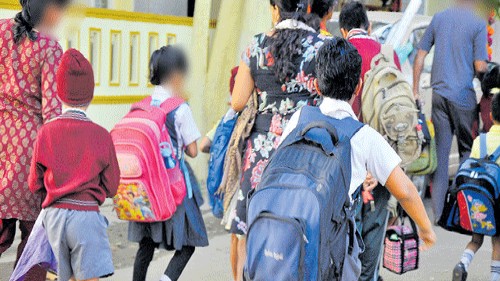
CISCE board tells affiliated schools to follow state rules for teaching Kannada (Image for representation).
Credit: DH File Photo
Bengaluru: The Council for the Indian School Certificate Examinations (CISCE) told its member schools on Tuesday to follow the state rule on teaching Kannada as either the first or second language.
The diktat came at a meeting of CISCE school heads, providing a shot in the arm for the state government, which recently notified amendments to the Karnataka Education Institutions (Issue of No Objection Certificate and Control) Rules.
The new rules require all private schools following the CBSE and ICSE curricula to teach Kannada as either the first or second language. This is in line with the Kannada Language Learning Act, 2015, which makes teaching Kannada as either first or second language mandatory in all schools.
"Schools are bound to go by the state's policy. So, if the Karnataka government has made Kannada as the first or second language, then CISCE-affiliated schools are bound to follow it," CISCE chief executive and secretary Dr Joseph Emmanuel said at the meeting.
Emmanuel further said that the board must abide by each state's policy with respect to teaching languages. "Schools in Karnataka, as mandated by the government, would be expected to teach Kannada as either the first or the second language," he said.
At the meeting, the CISCE also responded the opinion that overpriced textbooks was among the reasons for students to move away from ICSE schools. "Schools have the freedom to choose textbooks till class 8. When you choose textbooks, be focused on experiential learning and moderate content,” CISCE chairperson Dr G Immanuel.
During the event, the CISCE announced that it will assess schools for their performance on the lines of Education World rankings.
Emmanuel said the assessments would act as a benchmark for healthy competition among schools. "Schools would be assessed based on at least six parameters. While the board could conduct inspections, schools can call on their peers for a revised assessment again and understand their performance. Room will be given for schools to ask the board for a re-assessment. And, 40% of the assessment will be based on teaching and learning. The rest includes infrastructure and other issues," he explained.
"If we look at the Shantiniketan model or Oxford education, we realise that the high standards are not because of extraordinary infrastructure or campus," Emmanuel said. "It is the quality of teaching."